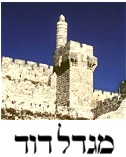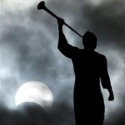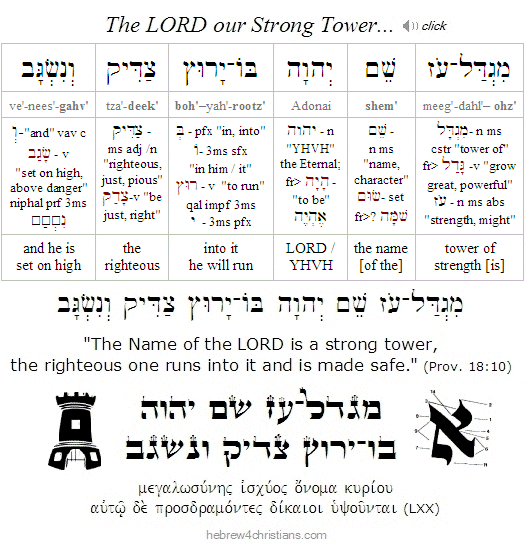|
UNLIKE THE PREVIOUS EIGHT PLAGUES, the ninth plague (darkness) did not cause physical damage but rather blinded and immobilized the Egyptians (Exod. 10:22-23). Among the sages, the question arose as to the nature of this darkness. The following quote comes from Shemot Rabbah 14:
"Stretch out your hand toward heaven and let there be darkness" (Exod. 10:21). Whence did the darkness come? Rabbi Judah and Rabbi Nehemiah discussed the question. Rabbi Judah said, 'From the darkness on high, as it was said: 'He made darkness his hiding place' (Psalm 18:12). Rabbi Nehemiah said, 'From the darkness of hell. As it is said, 'A land of thick darkness, as darkness itself' (Job 10:22).
Did the plague of darkness come as a consequence of God's Presence drawing near to Egypt (i.e., the 'darkness on high'), or was it the result of His Presence being removed (i.e., the 'darkness of hell')? In other words, did God cause the darkness to come or did He permit the forces of chaos - the powers of hell - to be unleashed for a season?
The first kind of darkness (the 'darkness on high') represents a "cloud of unknowing," a sort of holy darkness that surrounds the glory of God. We are incapable of penetrating this darkness not only because of sin but because we are finite and limited creatures. God is infinite and therefore inherently unknowable, at least regarding His inner life and essence, and some things about Him we will never understand or know (Isa. 55:8-9). Moses was able to "draw near to the thick darkness" on Sinai, though he only saw visions and patterns of the divine realm: he could not directly see the "face" of God and live (Exod. 33:20). As the psalmist said, יָשֶׁת חשֶׁךְ סִתְרוֹ / yashet choshekh sitro: "He puts darkness as His secret place" (Psalm 18:11). As Moses himself later wrote: הַנִּסְתָּרת לַיהוָה אֱלהֵינוּ / ha-nistarot la-Adonai Eloheinu: "the secret things belong to the LORD our God" (Deut. 29:29).
The second kind of darkness is the absence of the constraining power of light. It suggests God removing His protection and care, which allowed the powers of hell to be unleashed for a season. Such darkness symbolizes intellectual, moral, or spiritual incomprehension. "They did not see one another, nor did anyone rise from his place for three days..." (Exod. 10:23).
Perhaps the answer to the original question is both: God both drew near and God withdrew from Egypt. Though He indeed fills the heaven and the earth, the LORD is both a "God who is near" (קָרוֹב) and a "God who is far" (רָחוֹק) (Jer. 23:23-24). To those who welcome Him, the LORD gives light and freedom, but to those who recoil from Him, the LORD is a blinding power that immobilizes. While Egypt was covered in darkness for three days, "all the children of Israel had light in their dwellings" (Exod. 10:23).
יוֹצֵר אוֹר וּבוֹרֵא חשֶׁךְ
עשֶׂה שָׁלוֹם וּבוֹרֵא רָע
אֲנִי יהוה עשֶׂה כָל־אֵלֶּה
yoh'·tzeir · ohr · oo·voh·rei · khoh'·shekh
oh'·seh · shah·lohm · oo·voh·rei · rah'
a·nee · Adonai · oh·seh-khol · ei'·leh

I form light and create darkness,
I make peace and create evil;
I the LORD do all these things.
(Isa. 45:7)
Regardless of how we might try to understand this paradox, it is clear that the moral and spiritual depravity of Egypt was so great that God judged the "world below" with the divine command: "Let there be darkness" (וִיהִי חשֶׁךְ) - a direct reversal of His very first recorded command, "Let there be light" (יְהִי אוֹר). The absence of the Divine Light suggests a hellish gloom, a realm entirely devoid of God's presence, the chaos of the world before God began fashioning it (Gen. 1:2).
This is not unlike the political conditions that appear to be operating in the world today. Modern day America has become a place of untold depravity and corruption, with moral and spiritual blindness in "high places." Whenever the leaders of nations attempt to usurp the authority of God and enslave people, judgment from heaven is imminent: "Let there be darkness..." Among the nations, blindness and apostasy are ubiquitous. Collectively, the powers of the world speak as Pharaoh of old: "Who is the LORD that I should obey His voice?" (Exod. 5:2). As it is written: "The kings of the earth station themselves, and the rulers take counsel against the LORD, and against His Mashiach, saying, 'Let us break the cords of their yoke and shake off their ropes from us'" (Psalm 2:2). Regarding the realm of the Spirit, dwelling in spiritual darkness is ultimately a moral choice: "And this is the judgment: the light has come into the world, and people loved the darkness more than the light, because their works were evil" (John 3:19). A future time of catastrophic and worldwide judgment is appointed for the End of Days. This time is drawing near, and for all the more reason we should appeal to the LORD God of Israel to preserve us as He did Israel in the land of Goshen. May the LORD help us all abide in His light, until our change finally comes (Job 14:14).
מִגְדַּל־עז שֵׁם יְהוָה
בּוֹ־יָרוּץ צַדִּיק וְנִשְׂגָּב
meeg·dal-ohz shem Adonai,
boh-yah·rootz tza·deek ve·nees·gahv

"The Name of the LORD is a strong tower;
the righteous one runs into it and is made safe."
(Prov. 18:10)

Hebrew Lesson:
Proverbs 18:10 reading (click for audio):
|




